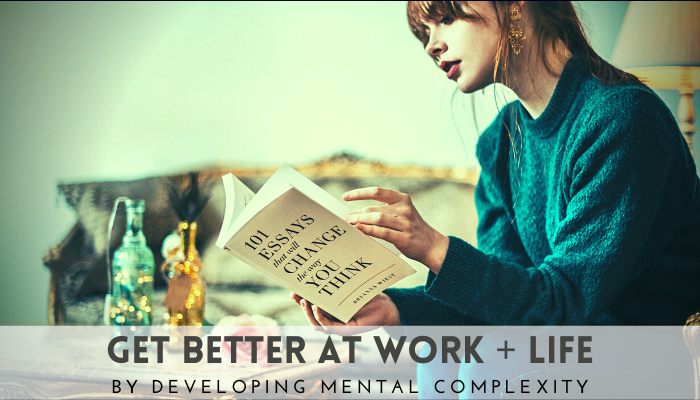How to Effortlessly Unleash Your Creativity and Insight Contributed by: Georgia Ellis Getting out of bed usually takes me a while, and I used to think this was a bad thing. Why aren’t I jumping out of bed like everyone else? I had pretty good sleep hygiene practices and usually get between 7-8 hours of sleep… surely I can get up straight away… but I couldn’t… I even began to feel a little guilty at my slower start to the day, especially when people like Mel Robbins (American podcast host, author, motivational speaker, and former lawyer) devoted an entire book to “The 5 Second Rule” - a simple technique to encourage us to leap out of the sweet warm comfort of our beds and go get our goals… Robbins used it to help herself get out of bed, back in her tough days. She found that if she counted backwards; “5-4-3-2-1 and ACTION!”, she would stop making excuses and jump right up. I won’t deny that having a hard time waking up in the morning could be the result of the natural effects of sleep inertia, your sleep habits and schedule, or sometimes other conditions… but in my case, there was something else going on, something that seemed to leave me feeling inspired and set me up for the day… I noticed that if I lingered in bed for roughly 10-15 minutes upon waking, something magical began to happen…Ideas and solutions would bubble up from within my psyche… ideas for programs and offerings, solutions to problems I was facing and even ways to have challenging conversations I was avoiding would present themselves.
As I lay there, I seemed to have access to what Napoleon Hill refers to in his seminal work “Think and Grow Rich” as “Infinite Intelligence”. According to Hill, Infinite Intelligence refers to a universal, all-encompassing intelligence that exists beyond the realm of human understanding. It's a form of divine intelligence that is accessible to individuals through their subconscious minds. Hill suggests that Infinite Intelligence is the source of all inspiration, creativity, and knowledge. It's the force that can guide individuals toward their goals and desires if they learn to tap into it effectively. Is this what I was tapping into as I lingered longer in bed? According to Hill, we can communicate with and receive guidance from this infinite intelligence, which can help us achieve our goals. Let's face it, as business owners, managers, and leaders, we're constantly striving to innovate, solve problems, and drive success. But what if we are overlooking one of the most powerful moments for creativity and insight that happens not in the boardroom, or brainstorming session but in the quiet moments between sleep and wakefulness? Picture this: you wake up in the morning, the soft glow of dawn filtering through your window. Instead of immediately leaping out of bed and diving into the day's tasks, you take a moment to linger, to let your mind gently transition from the depths of sleep to the clarity of wakefulness. It's in this seemingly idle moment that magic can happen. The science behind this phenomenon is fascinating. As we transition from sleep to wakefulness, our brain undergoes a subtle but significant shift in activity. During deep sleep, our brain produces delta waves, associated with restorative rest. But as we awaken, our brain begins to generate alpha and theta waves, which are linked to relaxation and creativity. It's during this transition that our subconscious mind comes to life. While we sleep, our brains are hard at work processing memories, emotions, and even problem-solving tasks. Ideas and insights percolate beneath the surface, waiting for the opportune moment to emerge. By taking a few moments to linger in bed upon waking, we create a space for these ideas to land. We tap into our subconscious reservoir, allowing creativity to flow freely. This relaxed state of mind, coupled with the transition in brainwave activity, sets the stage for breakthrough thinking and innovative solutions. But for some, lingering in bed can be torture when our lives are full of work and home life responsibilities that don’t allow for an extra 10 minutes under the blankets. If you want to take advantage of this powerful state without staying in bed, try delaying devices, screen time, and coffee until after low cognitive activities such as yoga, a shower or a walk. These activities have been known to also produce ideas and insights. There is also the danger of staying in bed too long as you will naturally move out of the Alpha/Theta creative state into the more active Beta brainwave, where your analytical mind and inner critic will start to emerge. So, if you can take a few extra moments in the morning, be sure to get up and act on the ideas and insights that emerge. For me, I usually head straight to my home office and write down the ideas that present themselves, then go about my morning routine and return to my office to take inspired action. Point in case, the idea for this article bubbled up earlier this week, I made a note of it when I got up, did some research, and scheduled today to write and post it. Remaining in bed is not just about the science. It's also about mindfulness and reflection. In our fast-paced world, we're often guilty of rushing from one task to the next without pausing to breathe. By lingering in bed for a few moments each morning, we practice mindfulness. We become more present, more aware of our thoughts and feelings. This mindfulness sets a positive tone for the day ahead, enhancing our overall well-being and mental clarity. So, the next time you find yourself tempted to leap out of bed as soon as you wake up, whether you feel like it or not, like the famous influencers are telling us to do, consider this: don’t reach for your phone, but give yourself permission to linger for just a few moments longer. You might unlock the key to your next big idea. Embrace the transition from sleep to wakefulness and watch as creativity and insight flourish. Your success may just depend on it. Photo by Thought Catalog on Unsplash Contributed by Layla Wyatt The Australia and New Zealand School of Government suggests that mental complexity might be the key to unlocking better performance at work and a better quality of life. The more you understand your motivations, goals, thoughts, and emotions, the better equipped you will be to achieve your ambitions. "No one knows for sure, but many believe that having high mental complexity can confer several advantages in both work and life. This is because mentally complex individuals tend to be strategic thinkers, able to multitask and process multiple streams of information, which is a big asset to the workforce, especially in business industries," says business funding expert Shane Perry of Fund Spot—Australia's top provider of business funding solutions One facet of mental complexity is how individuals relate to the outside world and themselves. It depends on whether they can differentiate between the thoughts and feelings that they have and the thoughts and feelings that "have me." Developing mental complexity skills can benefit your personal and professional life. Here are some ways in which mental complexity can help you 1. Improved Decision Making Mental complexity can enhance your ability to consider multiple perspectives, anticipate potential outcomes and evaluate alternatives. This can lead to improved decision-making by enabling you to make more informed and effective choices. 2. Improved Ability To Work Through Difficult Situations Having a higher level of mental complexity can enhance your ability to work through difficult situations by enabling you to consider a broader range of perspectives, analyse complex information more effectively, and devise creative solutions to problems. This can lead to greater adaptability, resilience, and success in personal and professional settings. 3. An Increase In Clear And Effective Communication
4. Enhanced Capability Of Adapting To Changing Circumstances Mental complexity can enhance your capability to adapt to changing circumstances by enabling you to consider multiple perspectives and solutions. A more complex understanding of the world may better equip you to navigate unexpected challenges and identify opportunities for growth and learning. 5. Improvements To The Working Experience A greater mental complexity can lead to an enhanced working experience. This complexity allows individuals to think more critically and creatively, leading to better problem-solving skills and the ability to approach tasks from various angles. Start Developing Your Mental Complexity Developing mental complexity is not an overnight process but a critical component of personal growth and development. To start, expose yourself to different ideas and perspectives, seek diverse experiences, and challenge your assumptions and beliefs. It is also advisable to seek some help and guidance from professionals.
Blue Chip Minds established existing programs such as The Superior Thinkers Toolbox, Life Reloaded and The Future Ready Leader's Toolkit to inform people about what science is learning about the human condition and our untapped potential. We demonstrate to participants how to connect various maps, models and tools and use the concepts professionally and personally. Our method results in genuine transformation, increased mental complexity, long-lasting behavioural modification, and attitude adjustments. Contact us for more information. |
Authors
Our Contributors are a mix of passionate and switched on Humans ready to share their, career, business, well-being, leadership and performance insights with you so you can be the architect of your own extraordinary future! Archives
May 2024
Categories
All
|
Global professional development solutions for individuals and organisations.
Working with Individuals and organisations in;
Australia | Singapore | Hong Kong | United States | India | United Kingdom | Dubai | China | Poland
Malaysia | New Zealand | Japan | Belgium | Austria | South Africa | Brazil | Canada
Working with Individuals and organisations in;
Australia | Singapore | Hong Kong | United States | India | United Kingdom | Dubai | China | Poland
Malaysia | New Zealand | Japan | Belgium | Austria | South Africa | Brazil | Canada
|
We acknowledge the Traditional Custodians of the land on which we live, work, meet and play. This most often is the Wurundjeri people. We pay our respects to Elders past, present and emerging of the Kulin Nation. We extend gratitude and respect to Aboriginal and Torres Strait Islander peoples and global indigenous cultures for their incredible wisdom, resilience, deep connection to the natural environment and their deeply transformative spiritual practices.
We have so much more to learn from you. |
Copyright © All Rights Reserved BLUE CHIP MINDS 2013 - 2021




 RSS Feed
RSS Feed
